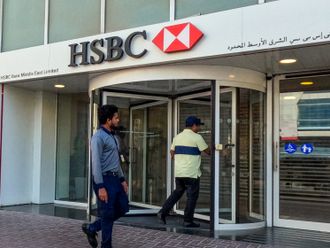Tokyo: Japanese banks are selling subordinated bonds at the fastest rate since 2009, taking advantage of a drop in borrowing costs before stricter capital rules are introduced next year.
Four lenders sold a combined 356 billion yen (Dh16 billion) of such notes so far this year, compared with 217 billion yen in the first two months of 2011, data compiled by Bloomberg show.
Mitsubishi UFJ Financial Group's banking unit issued 152 billion yen of 10-year subordinated bonds this month with a coupon of 1.1 per cent for the first five years, lower than 1.77 per cent for similar securities it sold in March 2011.
The so-called Basel III rules that begin in 2013 will require banks to phase out counting subordinated debt as second- tier capital over 10 years in favour of securities that absorb losses.
Mitsubishi UFJ, Sumitomo Mitsui Financial Group and Mizuho Financial Group, Japan's biggest banks, already have enough top-tier capital to meet the new Basel standards, having raised about 4.5 trillion yen selling shares since December 2008.
"Before the new capital rules kick in, lenders are rushing to sell bonds on the expectation that the costs of raising contingent capital would rise from 2013 onwards," said Takayuki Atake, a credit analyst at SMBC Nikko Securities in Tokyo.
He estimates banks will sell as much as 1.5 trillion yen of subordinated debt this year. That would only trail 2.5 trillion yen in 2009 as the most since 1999, Bloomberg data show.
Avoid another crisis
Holders of subordinated bonds receive payment only after senior debt holders' claims are paid in full in the event of bankruptcy. They are currently counted as lower Tier-2 capital.
The Basel Committee on Banking Supervision developed the latest rules to avoid a repeat of the 2008 global financial crisis, when banks had insufficient capital to cover losses.
The average yield on bonds of worldwide financial companies with maturities of at least 10 years fell to 5.9 per cent on Feb. 23 compared with 6.3 percent at the end of last year, according to Bank of America Merrill Lynch Indexes.
Mitsubishi UFJ went ahead with its sale of subordinated notes in anticipation of the new capital standards as well as "strong retail investor demand" for the securities, said Shinya Matsumoto, a Tokyo-based spokesman for Japan's biggest bank.
"We have yet to plan a sale of Basel III-accommodating bonds partly because there's uncertainty over the cost of such capital notes meeting new regulations," Matsumoto said.
Dollar sale
Sumitomo Mitsui, Japan's second-largest bank by market value, sold dollar-denominated subordinated bonds this month for the first time since July 2005. The $1.5 billion sale of 10-year, 4.85 per cent notes came after it lured $9 billion of orders from institutional investors in Europe and Asia outside of Japan, said Kyosuke Hattori, a Tokyo-based spokesman for the bank.
The retail lending unit of Mizuho, the country's third- biggest bank, will sell 63 billion yen of 10-year, 1.67 per cent subordinated bonds, a finance ministry filing showed on February 10.
Outstanding subordinated bonds issued by Japanese banks now total 11.1 trillion yen, according to data compiled by Bloomberg. That's equivalent to 1.3 per cent of their assets.
Elsewhere in Japan's credit markets, Tohoku Electric Power started marketing a sale of about 25 billion yen of bonds, with pricing scheduled for the latter half of the week, according to two people with direct knowledge of the matter. The offer would be the first by a Japanese power company that has a nuclear reactor since a record earthquake on March 11.
Turkey's samurais
Turkey began marketing an offering of 10-year Samurai bonds planned for March 8, according to a person with direct knowledge of the matter. It told investors it plans to price the bonds to yield between about 35 and 45 basis points more than the yen swap rate, said the person, asking not to be identified as the information is private.
The bonds will be guaranteed by the Japan Bank for International Cooperation, the person said.
The extra yield investors demand to hold yen debt sold by overseas issuers instead of government securities was 149 basis points on Thursday, according to an index compiled by Bank of America Merrill Lynch. That compared with the spread on Japanese corporate debt of 48 basis points, and 217 basis points globally, the data show.
The yen traded at 80.55 per dollar at 4.10pm in Tokyo on Friday. It was the biggest loser among 10 developed-nation currencies tracked by Bloomberg Correlation Weighted Indexes, declining 1.9 per cent during the week. The dollar weakened 0.7 per cent and the euro rose 1.2 per cent in the same period.
The yield on Japan's benchmark 10-year note fell half a basis point on February 24 to 0.97 per cent.
Five-year credit-default swaps on Japanese government bonds declined one basis point to 122 basis points on Thursday in Tokyo, according to CMA, which is owned by CME Group and compiles prices quoted by dealers in the privately negotiated market. The swaps reached an all-time high of 154.8 on October 4.
The contracts, which pay the buyer face value if a borrower fails to meet its obligations, rise as perceptions of creditworthiness deteriorate.
Japanese banks avoided the taxpayer bailouts received by their US and European peers during the 2008 crisis, having repaired balance sheets after the collapse of the country's asset bubble more than a decade earlier.
Mitsubishi UFJ estimates it held common equity of more than 8 per cent of its risk-weighted assets as of December 31, while Sumitomo Mitsui owned about 7 per cent. The Basel Committee has agreed to boost the minimum capital requirements in stages to 3.5 per cent by January 2013 and 7 per cent by January 2019. The ratio for Mizuho is 7.97 per cent, including some preferred stock that is due to be converted to common equity before 2019.
The average cost of insuring subordinated bonds of Japan's three biggest banks for five years was 238 basis points on Thursday, according to CMA prices. That compares with 387 basis points for credit-default swaps on equivalent debt of Bank of America, the second-largest US bank by assets, and 376 points for BNP Paribas, France's biggest bank.
Loss- absorbing clauses
Some global banks have begun selling bonds with loss- absorbing clauses in an effort to satisfy regulators. UBS AG, Switzerland's biggest lender, sold $2 billion of 10-year contingent capital bonds this month priced at par to yield 7.25 per cent. Credit Suisse Group and Rabobank Groep have also sold contingent securities, which inflict losses on investors when capital buffers weaken.












